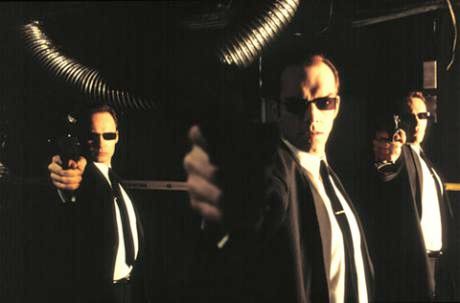On death and free minds
For many years, a certain scene from a certain movie has troubled me deeply. In The Matrix (1999), there is a scene where the character 'Neo' is killed. Stone dead, no heartbeat for over thirty seconds, multiple bulletholes through chest. And then his girlfriend, 'Trinity', kisses him; and just like in the fairy tales, he magically comes back to life.
I have had far more than the recommended dosage of The Matrix in my time. In watching the film, my friends and I have developed a tradition of sorts, in that we have always derided this particular scene as being 'fake' and 'medically impossible'. We endlessly applaud the dazzling special effects, the oh-so-cool martial arts, the ultra-quotable screenplay, and the relishably noirish techniques, all of which the film overall is brimming with; nevertheless, we cannot help but feel disappointed by this one spot, where it seems that romantic melodrama has thwarted plausibility.
But like Neo, I believe that I may finally have the answer.
Ironically (and, since The Matrix itself has so much irony of a similar nature, doubly ironically), the answer has been staring me in the face all along. Indeed, like Morpheus, I too "came to realise the obviousness of the truth".
In almost any other movie, there can be no acceptable excuse for bringing someone back from the dead. It's a moviemaking sin. It's the lazy way to set the film's plot back on course, and the cheap way to engender drama and climax. This is because films are expected to follow the same rules that apply in the real world. When someone dies in real life, they stay dead. There is no way to reverse what is, by its very definition, fatal. Even in the realm of sci-fi, where technology is capable of anything, there is an unwritten rule that even the best gadgets cannot undo death - at least not without some serious scientific justification. Surely The Matrix is not exempt from this rule? Surely the film's producers cannot expect to conjure up the impossible on-screen, and expect something as unscientific as a kiss to qualify as "serious scientific justification"?
But what we can so easily forget, when making all these judgements, is the central theme and message of The Matrix. This message is constantly re-iterated throughout the film:
- There Are No Rules
- There is no spoon
- Free your mind
- What is real?
- The mind makes it real
In a nutshell, this quote sums it up best:
What you must learn is that these rules are no different than the rules of a computer system. Some of them can be bent. Others can be broken.
By being 'The One', Neo's job is to understand and fully absorb the concept that everything in life is a rule, and that every rule can be broken. What is a rule? A rule is something that determines cause and effect. What happens if you are able to 'break' a rule? The cause occurs, but the effect does not. Simple as that. The only tricky bit is: how do you break a rule? You choose to deny that the rule applies to you, and therefore you are not governed by that rule. That last bit is the only bit that we haven't (yet?) proven in real life.
So, what are some basic rules that virtually all of the main characters in The Matrix learn to break, and that the audience is generally able to accept as being 'broken'? Gravity. Speed. Agility. Stamina. To name a few.

When you think about it like this, it becomes clear that death is just another one of these rules; and that if (according to 'Matrix logic') you are able to choose to deny death, then being killed (i.e. 'the cause') should not necessarily result in your dying (i.e. 'the effect'). In fact, when you follow this logic, then it could be argued that had Neo died permanently, he would have been permanently affected by the 'rule of death', and hence the movie would have been inconsistent. Instead, the movie portrays death as 'the ultimate rule to overcome'; and when Neo does succeed in thwarting it, he suddenly finds himself utterly unshackled from the confines that the Matrix attempts to place upon him.
The mind has an instinctive conviction that when the body is fatally injured, the whole bang shoot (i.e. mind / body / soul) ceases to function. By freeing your mind of this conviction, you are freeing yourself from the consequences that the conviction entails. That's the theory being touted, anyway. Personally, I find it to be a very self-centred and arrogant theory, but an enthralling one nonetheless.
This logic has helped me to 'accept' Neo's death and re-animation somewhat. But I still have a healthy level of cynicism, and I hope you do too. Despite all the work I've just done justifying it, the re-animation was a second-rate effort at tying up the story, and it was particularly poorly executed with the Hollywood kiss 'n' all. This sin is only barely explainable, and is certainly not admirable. But at least it is (in my eyes, at least) excusable, which is more than I can say for any other movies that do it.